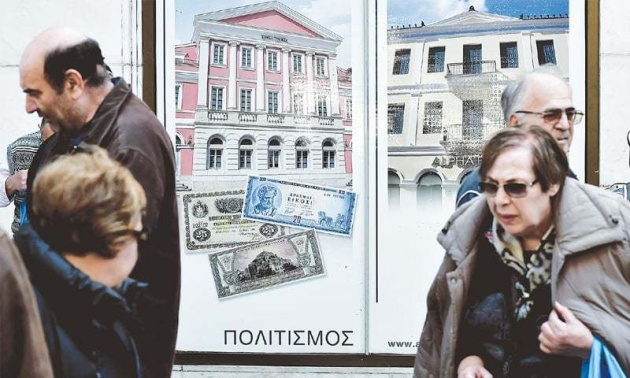
|
People walk past pictures of old drachma banknotes in Athens on April 1. Cash-strapped Greece has garnered a little over 147m euros via a debt forgiveness scheme designed to bolster the state’s near-empty coffers. The finance ministry said over 150,000 private individuals and companies had hastened to settle or partially repay debts to the state dating to the 1970s. The ministry said under normal circumstances, repayment of such debts ‘is close to zero’.—AFP
|
Since the election of Greece’s Syriza-led government, negotiations over its place in Europe have gone terribly, with posturing on one side and annoyance on the other. An accidental exit from the eurozone has become quite likely. This is not because Greece wants it nor because its partners are set upon it. It is because Greece is running out of hope, its partners are running out of patience and the negotiations are running out of time. A fork in the road does indeed lie ahead. But the choice of direction has to be deliberate, not accidental.
A looming liquidity crisis is the reason for fearing a precipitate decision. Greece’s creditors want the country to implement reforms before they unlock some 7.2bn euros in undisbursed bailout funds. Greece needs this money to meet domestic spending obligations and a 450m euros loan repayment due to the International Monetary Fund. Since the European Central Bank is curbing lending by Greek banks, the country’s government could run out of money. That might trigger a run by Greek depositors. While the ECB could manage this, it might feel unable or unwilling to do so.
A country is most likely to leave the euro if its government cannot meet its obligations, its banks close their doors, its economy is depressed and its politics are turbulent. Greece might soon be in this state. A chaotic exit may then occur. It is vital to avoid such a ‘Greccident’.
Keeping Greece in leaves the option of exit open, but exit is probably irreversible.... the exit would transform the eurozone from an irrevocable currency union into a regime of hard exchange-rate pegs
It has been evident since the government was elected that it would take time to learn whether a fruitful agreement could be reached. It is necessary to ‘buy’ that time. In seeking to reach a deal, it would also be helpful to put destructive moralism to one side. The creditor side considers its generosity to profligate Greeks exemplary. The Greeks believe that private lenders were guilty of irresponsible lending, that the ‘rescue’ was not of Greece but of those selfsame careless lenders and, above all, that Greeks have suffered enough. Both positions have merit. But no good will come from hurling such charges at one another.
Assume that an accident is avoided. Then the eurozone faces a big choice and a smaller one. The big choice is whether to keep Greece inside the eurozone or help it leave. The smaller choice is between alternative ways of keeping it inside. Keeping Greece in leaves the option of exit open, but exit is probably irreversible.
What are the arguments in favour of exit? One is that the costs of contagion to other members are far lower than earlier, as the divergent spreads in yields on government bonds indicate. Another is that Greece has proved unable to reform. Yet another is that Greece remains internationally uncompetitive, as shown by the sluggishness of its exports. External balance has come at the price of massive unemployment — a huge ‘internal imbalance’.
Against this, exit would transform the eurozone from an irrevocable currency union into a regime of hard exchange-rate pegs. That would be the worst of both worlds: neither as credible as a union nor as flexible as floating rates. Moreover, exit — particularly if unassisted — could cause grave economic and geopolitical consequences. Greece might plunge into an economic abyss. Abandoned by Europe, it might turn towards unfriendly powers. This would be a strategic disaster. Finally, Greece has already suffered the pains of austerity. From now on, things should get better, provided policy improves.
Trying to keep Greece inside the eurozone looks the better choice. I can identify two options.
The first would be a further rescue programme, one that promised relief from Greece’s debts after the reforms are completed. The second option would be to end the policy of ‘extend and pretend’. Instead, debt service obligations would be reduced to manageable levels. But there would be no further assistance. Greece would be on its own. The Greek government would keep the euro, but might need to impose controls on the currency’s use. In the short run, the government might also supplement euros with domestic IOUs that can be used to meet obligations to the Greek state. It would then have turned the euro into a parallel currency, either temporarily or semi-permanently.
The other big option is for the eurozone to agree that for Greece continued membership cannot work. The best justification for this would be that the Greek economy will be unable to be competitive inside the eurozone. Yet Greece would not just crash out; it should be helped out, instead.
That help would, once more, have to include permanent reductions in debt service. Controls on withdrawals from banks would again be needed. In addition, Greece would require further loans to prevent an overshoot in the value of the new currency. Greece would of course remain in the EU. The possibility might even be left open that it could return to the euro in the distant future.
None of these options is without risk. All are going to create significant problems. But there are at least two fundamental points to be borne in mind. The first is that the decision must be deliberate, not the result of running out of time. The second is that the choice to be made is a strategic one, both for the eurozone and for Greece.
On balance, I believe the right choice — and certainly the one the Greeks themselves want — is to discover a mutually satisfactory way to keep Greece inside the eurozone, along with generous but conditional debt relief and further time-limited support. But a case can also be made for exit, provided it is done in a way that contains chaos and achieves a permanent improvement in Greek competitiveness. But this, too, would require substantial debt relief.
Now is not the time to make the big decision on whether to keep Greece inside the eurozone and, if so, how. But it will come soon. So prepare properly.
Published in Dawn, Economic & Business, April 6th, 2015



